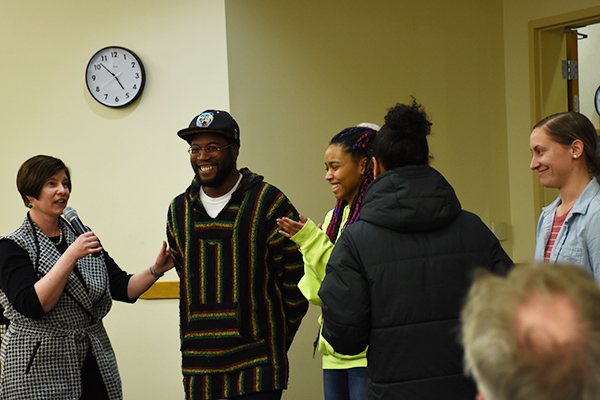Theatre for social justice
02/27/2019

Melissa Friesen led a discussion of race and education issues using community-based theatre techniques.
Bluffton professor uses theatre techniques for social justice discussions
On a Friday afternoon at Bluffton University, Dr. Melissa Friesen, professor of theatre and communication, convinced a group of faculty, staff and students nearly ready to pack up for the day to instead get outside of their comfort zones and engage in theatre.
Friesen presented a piece of forum theatre around the issues of race and education. She invited attendees to participate as actors and provide feedback. This type of community-based theatre has a purpose that extends well beyond entertainment, its intent is to engage and spark change.
“I use theatrical techniques to reach non-theatre people to explore an issue of social importance or concern,” explained Friesen. “The techniques help us come at the issue from new angles.”
Friesen has studied the practice for more than a decade as the Mary Nord and Joseph Ignat endowed chair in theatre. In 2013 she developed the class Theatre for Social Change, a mainstay on Bluffton’s campus. This year she’s also designing interactive theatre workshops, in collaboration with students, related to Bluffton’s Civic Engagement theme—When Talking is Tough: Respectful Conversations in a Divided Nation.
“At the end of the workshops, when we have time to discuss and reflect, I often hear people say that they were emotionally engaged with the activities,” said Friesen. “They are more empowered to share their own experiences without us requiring them to do that. We’re developing a space to allow that to happen.”
In the fall, Friesen and members of Bluffton’s multicultural student organization developed a workshop on race and privilege using the community-based theatre techniques. The workshop features three parts—a warmup activity that involves movement, an activating scene and a reflection on the issue.
The warmup “physically primes the body” said Friesen and leads to more engagement in the activating scene which features the issue being addressed. During Friesen’s Colloquium, two student actors portrayed a fictional scene of racism in the classroom—a scenario inspired by discussion during the fall workshop. The scene was performed multiple times with different members of the audience taking on the role of the protagonist and improvising ways to change the dynamics of the scene.
“We are deliberately showcasing that there is not one right answer and that issues are not solved easily in real life,” explained Friesen. “These techniques assume that dealing with an issue takes collective brainstorming with different individuals who have different approaches.”
To work through the emotions brought about by the activating scene, Friesen presented an image theatre technique called a fluid sculpture. Participants were encouraged to reveal the protagonist’s thoughts by repeating a short phrase and movement representing the feeling.
“Simply putting yourself in a posture can bring up emotional or intellectual engagement that you don’t access by sitting,” said Friesen.
Friesen’s next workshop will take place during Bluffton’s annual Civic Engagement Day on April 3. Students in her Theatre for Social Change class are currently developing activating scenes that may be used during the event.